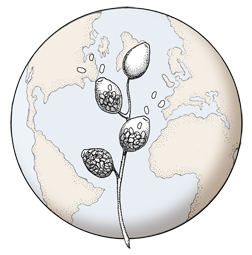References
. A microsatellite analysis identifies global pathways of movement of Phytophthora cinnamomi and the likely sources of wildland infestations in California and Mexico. Phytopathology [Internet]. 2019 . Available from: https://apsjournals.apsnet.org/doi/10.1094/PHYTO-03-19-0102-R
. Susceptibility to Phytophthora cinnamomi of the commonest morphotypes of Holm oak in southern Spain. Forest Pathology [Internet]. 2012 ;42:345–347. Available from: http://dx.doi.org/10.1111/j.1439-0329.2011.00758.x
. First Report of Phytophthora acerina, P. plurivora, and P. pseudocryptogea Associated with Declining Common Alder Trees in Italy. Plant Disease [Internet]. 2020 ;104(6):1874. Available from: https://apsjournals.apsnet.org/doi/10.1094/PDIS-01-20-0186-PDN
. Dieback and Mortality of Pinus radiata Trees in Italy Associated with Phytophthora cryptogea. Plant Disease [Internet]. 2014 ;98(1):159 - 159. Available from: http://dx.doi.org/10.1094/PDIS-05-13-0572-PDN
. Coconut bud rot in Florida. [Internet]. 1928 ;Technical Bulletin 199:87 pp. Available from: http://ufdc.ufl.edu/UF00027165/00001
. Phytophthora multivora sp. nov., a new species recovered from declining Eucalyptus, Banksia, Agonis and other plant species in Western Australia. Persoonia - Molecular Phylogeny and Evolution of Fungi [Internet]. 2009 ;22:1-13(13). Available from: http://www.ncbi.nlm.nih.gov/pmc/articles/PMC2789538/
. Pathogenicity of Phytophthora multivora to Eucalyptus gomphocephala and Eucalyptus marginata. Forest Pathology [Internet]. 2011 ;42:289–298. Available from: http://dx.doi.org/10.1111/j.1439-0329.2011.00753.x
. Phytophthora diseases in New Zealand forests. New Zealand Journal of Forestry [Internet]. 2014 ;59(2):14-21. Available from: http://www.nzjf.org/abstract.php?volume_issue=j59_2&first_page=14
. Phytophthora species associated with diseased woody ornamentals in Minnesota nurseries. Plant Disease [Internet]. 2007 ;91(1):97 - 102. Available from: http://dx.doi.org/10.1094/PD-91-0097
. Detection and quantification of Phytophthora species which are associated with root-rot diseases in European deciduous forests by species-specific polymerase chain reaction. Forest Pathology. 1999 ;29(3):169 - 188.
. Involvement of Phytophthora species in the decline of beech Fagus sylvatica in Wallonia (Belgium). Commun Agric Appl Biol Sci. 2007 ;72:879-85.
. A duplex PCR method for the simultaneous identification of Phytophthora ramorum and Phytophthora kernoviae. EPPO Bulletin [Internet]. 2011 ;41:27–29. Available from: http://dx.doi.org/10.1111/j.1365-2338.2010.02431.x
. First Report of Phytophthora ramorum Causing Japanese Larch Dieback in France. Plant Disease [Internet]. 2018 :PDIS-02-18-0288. Available from: https://apsjournals.apsnet.org/doi/10.1094/PDIS-02-18-0288-PDN
. Detecting asymptomatic ink-diseased chestnut trees by the composition of the ectomycorrhizal community. Forest Pathology [Internet]. 2012 :n/a–n/a. Available from: http://dx.doi.org/10.1111/j.1439-0329.2012.00784.x
. Occurrence of Phytophthora cinnamomi in cork oak forests in Italy . Forest Pathology [Internet]. 2013 ;43(4):340–343. Available from: http://onlinelibrary.wiley.com/doi/10.1111/efp.12039/abstract
. A taxonomic re-evaluation reveals that Phytophthora cinnamomi and P. cinnamomi var. parvispora are separate species . Forest Pathology [Internet]. 2013 :n/a - n/a. Available from: http://onlinelibrary.wiley.com/doi/10.1111/efp.12064/abstract
. Dieback and mortality of Nothofagus in Britain: ecology, pathogenicity and sporulation potential of the causal agent Phytophthora pseudosyringae. Plant Pathology [Internet]. 2016 ;65(1):26 - 36. Available from: http://doi.wiley.com/10.1111/ppa.12399http://api.wiley.com/onlinelibrary/tdm/v1/articles/10.1111%2Fppa.12399
. Primeiro relato da podrida da estipe da pupunheira, causada por Phytophthora palmivora, no estado do Parana‘. Fitopatologia Brasileira [Internet]. 2004 ;29:680 - 682. Available from: http://www.scielo.br/scielo.php?script=sci_arttext&pid=S0100-41582004000600016&nrm=iso
. First report of Phytophthora boehmeriae on black wattle in Brazil. Plant Pathology [Internet]. 2006 ;55(6):813 - 813. Available from: http://onlinelibrary.wiley.com/doi/10.1111/j.1365-3059.2006.01462.x/full
. O complexo gomose da acácia-negra. Colombo-PR: Embrapa Florestas [Internet]. 2001 ;Circular Técnica, 44:8 pp. Available from: https://core.ac.uk/download/pdf/15427678.pdf
. Comportamento diferenciado da gomose de Phytophthora em diferentes alturas ao longo de troncos de acácia-negra (Acacia mearnsii) em Piratini, RS. Boletim de Pesquisa Florestal [Internet]. 2001 ;43:145-149. Available from: http://ainfo.cnptia.embrapa.br/digital/bitstream/CNPF-2009-09/30242/1/santos.pdf
. Gomose da acácia-negra: etiologia, análise temporal, perdas e controle genético. Boletim de Pesquisa e Desenvolvimento, Embrapa Florestas, Ministério da Agricultura [Internet]. 2007 ;31:28 p. Available from: http://www.infoteca.cnptia.embrapa.br/infoteca/bitstream/doc/312305/1/BPD31CD.pdf
. Phytophthora nicotianae: agente etiológico da gomose da acácia negra no Brasil. Fitopatologia Brasileira [Internet]. 2005 ;30:81–4. Available from: https://doi.org/10.1590/s0100-41582005000100015
. Phytophthora spp: distribuição e associação com espécies florestais. In: Congresso Brasileiro de Fitopatologia, 47. Congresso Brasileiro de Fitopatologia, 47. Londrina, Brazil: Sociedade Brasileira de Fitopatologia; 2014. Available from: http://www.alice.cnptia.embrapa.br/handle/doc/993792
. Root and crown rot of Brazilian pine (Araucaria angustifolia) caused by Phytophthora cinnamomi. Journal of Phytopathology [Internet]. 2011 ;159:194–196. Available from: http://dx.doi.org/10.1111/j.1439-0434.2010.01741.x



 ]
]